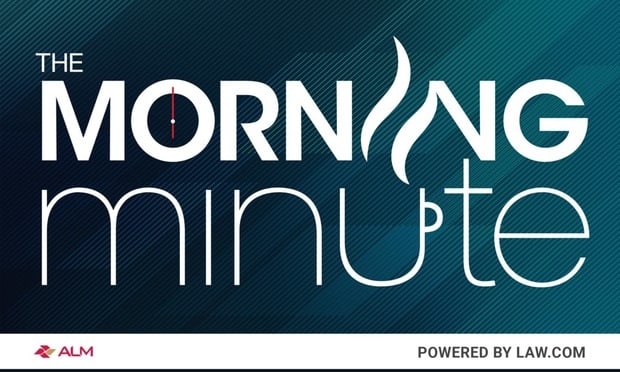Can Culture Carry a Law Firm Through Crisis? | Firms Learn the Value of Local Leadership | Google Turns to Freshfields for Antitrust Defense: The Morning Minute
The news and analysis you need to start your day.
February 01, 2021 at 06:00 AM
4 minute read
Want to get this daily news briefing by email? Here's the sign-up.
|
WHAT WE'RE WATCHING
CULTURE SHOCK - Midsize law firms have long touted their "midsize-ness" as an advantage, contrasting their collegial cultures with Big Law's cutthroat climate. But, as Law.com's Lizzy McLellan and David Gialanella write in a recent article for ALM's Mid-Market Report, no matter how good the vibes may be, a crisis will really test a firm's mettle—especially if that crisis causes a cash crunch. So can morale remain high when funds are tight and stress is rising? And, if so, is that enough? As Michael Stein, head of Pashman Stein Walder Hayden in Hackensack, New Jersey, noted, the firms—especially midsize firms— "that have the strongest sense of culture and community" tend to fare best, but the "reservoir of goodwill" can run dry. "If you have a bad year, if the culture is strong … you weather that storm," he said. "If you have five bad years, I don't care how good your culture is." For a free trial subscription to the Mid-Market Report, click here.
GOING LOCAL - When the global pandemic suddenly turned lawyers' (and everyone else's) lives upside down, it quickly became a apparent why every law firm needs a strong leader—or, more accurately, strong leaders. As Law.com's Justin Henry reports, the uncertainty, stress and confusion that set in with the arrival of COVID-19 reinforced for many firms that having localized leadership, rather than a decentralized management model, can be incredibly helpful. "What the pandemic brought home was that the office managing partners actually depend on communication among each other," said Mark Stewart, chairman of Philadelphia-based Ballard Spahr, which, until hiring one earlier this month, had not had a Philadelphia managing partner in a decade. "There was a sense that communication needed to be unified and we needed someone who can focus on the local needs of the city."
HEY GOOGLE, FIND ME A LAWYER - Google has turned to a legal team from Freshfields Bruckhaus Deringer and Axinn Veltrop & Harkrider to defend the antitrust lawsuit filed against the company in December by 10 states. The suit, pending in Texas Eastern District Court, accuses Google of monopolizing the market for online advertising through anticompetitive conduct and an unlawful agreement with Facebook. The case, assigned to U.S. District Judge Sean D. Jordan, is 4:20-cv-00957, The State Of Texas, et al v. Google, LLC. Stay up on the latest deals with the new Law.com Radar.
|
EDITOR'S PICKS
Sotomayor Denies Bid for Injunction From New York Families Seeking Relief From Vaccine Mandate By Jane Wester
Davis Wright Tremaine Will Require All Employees To Get a COVID-19 Vaccine Before Returning to the Office By Dylan Jackson Judge Sentences Ex-FBI Lawyer to 12 Months of Probation for Altering Key Email in Russia Inquiry By C. Ryan Barber Law.com Litigation Trendspotter: Fights Heat Up in Texas and Florida Over COVID-19 Liability Shields By Zack NeedlesJurors Begin Virtual Deliberations in First Remote Patent Jury Trial By Scott Graham
|
WHILE YOU WERE SLEEPING
WORTH A SHOT? - Governments can sue vaccine producers over delivery and distribution delays—but they probably won't, litigation and health sciences lawyers told Law.com International's Anne Bagamery. Italy, Poland and the European Union have brandished legal threats against vaccine producers over Europe's sluggish rollout, but attorneys said those threats are unlikely to lead to action. Instead, they're designed to put pressure on the producers and, potentially, help governments save face as their vaccination programs continue to drag. "Litigation takes a long time," said Sylvie Gallage-Alwis, a partner at Signature Litigation in Paris. "For most governments, it will not be seen as a good resource allocation."
|
WHAT YOU SAID
"You can measure performance and people in your organization when the skies are blue and the sun is shining, but you get a much better sense of the health of an organization when it's under pressure and stress and its people are under pressure and stress, and I can tell you our folks did incredibly well."
This content has been archived. It is available through our partners, LexisNexis® and Bloomberg Law.
To view this content, please continue to their sites.
Not a Lexis Subscriber?
Subscribe Now
Not a Bloomberg Law Subscriber?
Subscribe Now
NOT FOR REPRINT
© 2024 ALM Global, LLC, All Rights Reserved. Request academic re-use from www.copyright.com. All other uses, submit a request to [email protected]. For more information visit Asset & Logo Licensing.
You Might Like
View All
The Coming of Trump's Judicial Picks Spurs Liberals to Press for Biden's

Court Rules Mere Conduit Defense Not Suitable for a Motion to Dismiss
6 minute read

Many Lawyers Are Reeling From Election Results, but Leaders Are Staying Mum
6 minute readLaw Firms Mentioned
Trending Stories
- 1Elon Musk Names Microsoft, Calif. AG to Amended OpenAI Suit
- 2Trump’s Plan to Purge Democracy
- 3Baltimore City Govt., After Winning Opioid Jury Trial, Preparing to Demand an Additional $11B for Abatement Costs
- 4X Joins Legal Attack on California's New Deepfakes Law
- 5Monsanto Wins Latest Philadelphia Roundup Trial
Who Got The Work
Michael G. Bongiorno, Andrew Scott Dulberg and Elizabeth E. Driscoll from Wilmer Cutler Pickering Hale and Dorr have stepped in to represent Symbotic Inc., an A.I.-enabled technology platform that focuses on increasing supply chain efficiency, and other defendants in a pending shareholder derivative lawsuit. The case, filed Oct. 2 in Massachusetts District Court by the Brown Law Firm on behalf of Stephen Austen, accuses certain officers and directors of misleading investors in regard to Symbotic's potential for margin growth by failing to disclose that the company was not equipped to timely deploy its systems or manage expenses through project delays. The case, assigned to U.S. District Judge Nathaniel M. Gorton, is 1:24-cv-12522, Austen v. Cohen et al.
Who Got The Work
Edmund Polubinski and Marie Killmond of Davis Polk & Wardwell have entered appearances for data platform software development company MongoDB and other defendants in a pending shareholder derivative lawsuit. The action, filed Oct. 7 in New York Southern District Court by the Brown Law Firm, accuses the company's directors and/or officers of falsely expressing confidence in the company’s restructuring of its sales incentive plan and downplaying the severity of decreases in its upfront commitments. The case is 1:24-cv-07594, Roy v. Ittycheria et al.
Who Got The Work
Amy O. Bruchs and Kurt F. Ellison of Michael Best & Friedrich have entered appearances for Epic Systems Corp. in a pending employment discrimination lawsuit. The suit was filed Sept. 7 in Wisconsin Western District Court by Levine Eisberner LLC and Siri & Glimstad on behalf of a project manager who claims that he was wrongfully terminated after applying for a religious exemption to the defendant's COVID-19 vaccine mandate. The case, assigned to U.S. Magistrate Judge Anita Marie Boor, is 3:24-cv-00630, Secker, Nathan v. Epic Systems Corporation.
Who Got The Work
David X. Sullivan, Thomas J. Finn and Gregory A. Hall from McCarter & English have entered appearances for Sunrun Installation Services in a pending civil rights lawsuit. The complaint was filed Sept. 4 in Connecticut District Court by attorney Robert M. Berke on behalf of former employee George Edward Steins, who was arrested and charged with employing an unregistered home improvement salesperson. The complaint alleges that had Sunrun informed the Connecticut Department of Consumer Protection that the plaintiff's employment had ended in 2017 and that he no longer held Sunrun's home improvement contractor license, he would not have been hit with charges, which were dismissed in May 2024. The case, assigned to U.S. District Judge Jeffrey A. Meyer, is 3:24-cv-01423, Steins v. Sunrun, Inc. et al.
Who Got The Work
Greenberg Traurig shareholder Joshua L. Raskin has entered an appearance for boohoo.com UK Ltd. in a pending patent infringement lawsuit. The suit, filed Sept. 3 in Texas Eastern District Court by Rozier Hardt McDonough on behalf of Alto Dynamics, asserts five patents related to an online shopping platform. The case, assigned to U.S. District Judge Rodney Gilstrap, is 2:24-cv-00719, Alto Dynamics, LLC v. boohoo.com UK Limited.
Featured Firms
Law Offices of Gary Martin Hays & Associates, P.C.
(470) 294-1674
Law Offices of Mark E. Salomone
(857) 444-6468
Smith & Hassler
(713) 739-1250









